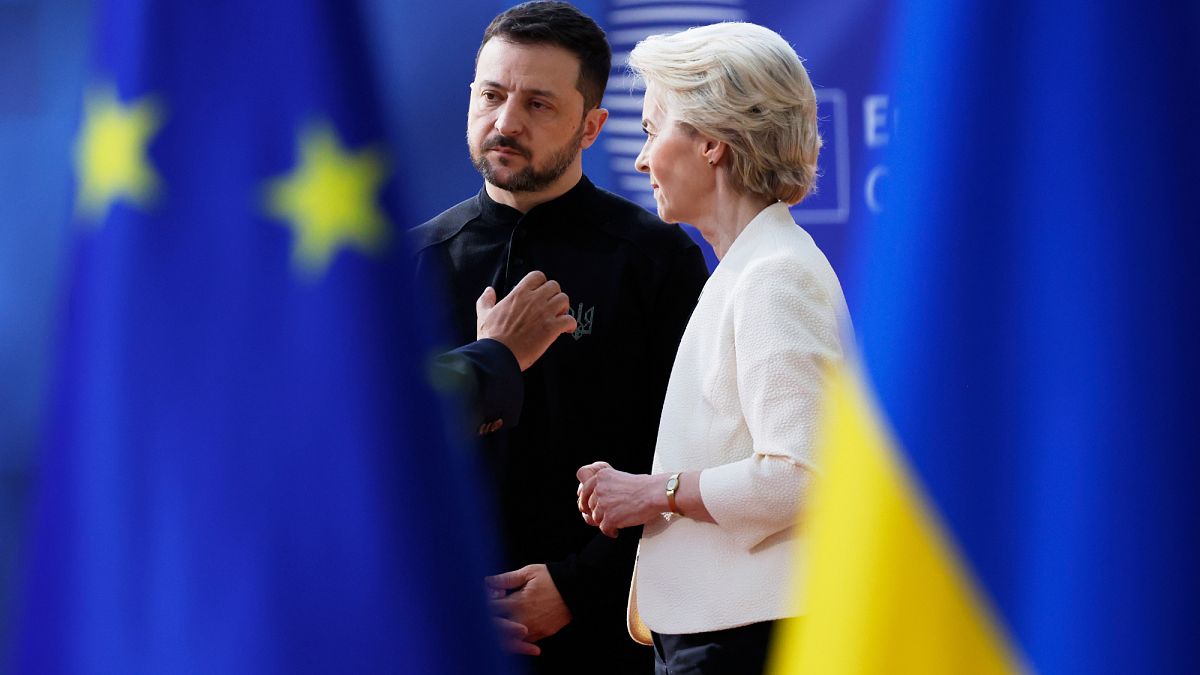With an existing temporary trade agreement between the EU and Ukraine set to expire on 5 June, member states have registered discontent with the European Commission’s inconclusive negotiation of a future arrangement with the war-torn state.
Tensions surfaced during a closed-door session of the EU’s monthly gathering of agriculture ministers in Brussels on Monday, during which member states’ representatives expressed frustration with the Commission for its failure to clinch a deal with Ukraine, despite having had ample time to do so, two people familiar with the meeting told Euronews.
Several ministers said they were unhappy that a stabler and permanent agreement with Ukraine was not reached, according to one of the people.
Others emphasised that finding a long-term solution for trade liberalisation with Ukraine should have been a priority for the Commission, which holds exclusive competence for negotiating trade deals, another person said.
Currently, trade between the EU and Ukraine is governed by Autonomous Trade Measures (ATMs), which temporarily suspend all tariffs and quotas on Ukrainian agricultural exports. These measures were introduced in response to Russia’s full-scale invasion in 2022.
However, the ATM scheme is set to expire next week and cannot be renewed again, having already been extended once. With its expiry looming, the Commission has been working unsuccessfully since late 2024 to establish a formal replacement.
“It’s no secret that talks between the Commission and Ukraine are underway. Let’s say they are still at an initial stage,” Polish agriculture minister, Czesław Siekierski, who currently holds the chairmanship of the EU Agrifish Council, acknowledged during a subsequent press conference.
Stopgap measures needed as talks stall
To bridge the gap left by the stalled trade talks, the Commission has prepared transitional arrangements that will apply until a review of the EU-Ukraine Deep and Comprehensive Free Trade Area (DCFTA) is completed and a revised deal is ready.
These interim measures were approved last week as a precaution by EU ambassadors.
Siekierski noted that the new measures, which replicate the terms of Ukraine’s pre-war association agreement with the EU, are “much less definite” than the ATM scheme regarding limits on Ukrainian agricultural imports.
In the meeting, the Commission reiterated its intention to move away from temporary solutions and establish a more stable trading framework.
“Farmers and stakeholders on both sides need predictability to plan ahead,” EU agriculture Commissioner Christophe Hansen told ministers, according to briefing notes shared by Commission spokespersons.
Hansen added that the Commission is in active contact with Ukrainian officials to swiftly reach a balanced agreement that reflects the interests of both sides.
Agriculture remains the most sensitive issue. The ATM arrangement has triggered backlash in several EU countries, particularly in France and Poland, where farmers have protested against the surge in Ukrainian imports since trade barriers were lifted.
On this point, the Commissioner reassured ministers that the transitional measures do not introduce new quotas or increase allowed import volumes for Ukrainian products.
Ukraine urges swift action
The meeting began with an address from Vitalii Koval, Ukraine’s minister of agrarian policy and food, who urged the EU to swiftly agree on a new free trade mechanism and find a balanced solution “based on numbers”, according to an EU source.
Koval reminded EU ministers that Ukraine is fighting to uphold European values and highlighted the recent toll of three consecutive nights of Russian attacks, which have severely strained the country’s infrastructure.
In his presentation, Koval underlined how critical the agricultural sector is to Ukraine. The EU source noted that Ukraine’s agriculture is seven times more significant to the economy of Ukraine than any EU country, with one in five Ukrainians employed in the sector.
Koval also cited a 20.5% drop in available farmland due to occupation, and referenced World Bank figures showing Ukraine has suffered €83.9 billion in agricultural damages and losses due to the war.
While the Commission’s current position is to reduce the market access levels previously allowed under the ATMs, Ukraine hopes to retain the same degree of access to the EU market.
Koval pointed out that 66% of Ukraine’s imports come from the EU and argued that if Ukraine were an EU member state, it would rank ninth in terms of agricultural exports within the bloc.
He also said he has been holding talks with EU farmers’ associations to address concerns about the high volume of Ukrainian imports, as part of Ukraine’s push to secure a future agreement with the Commission.
Read the full article here


